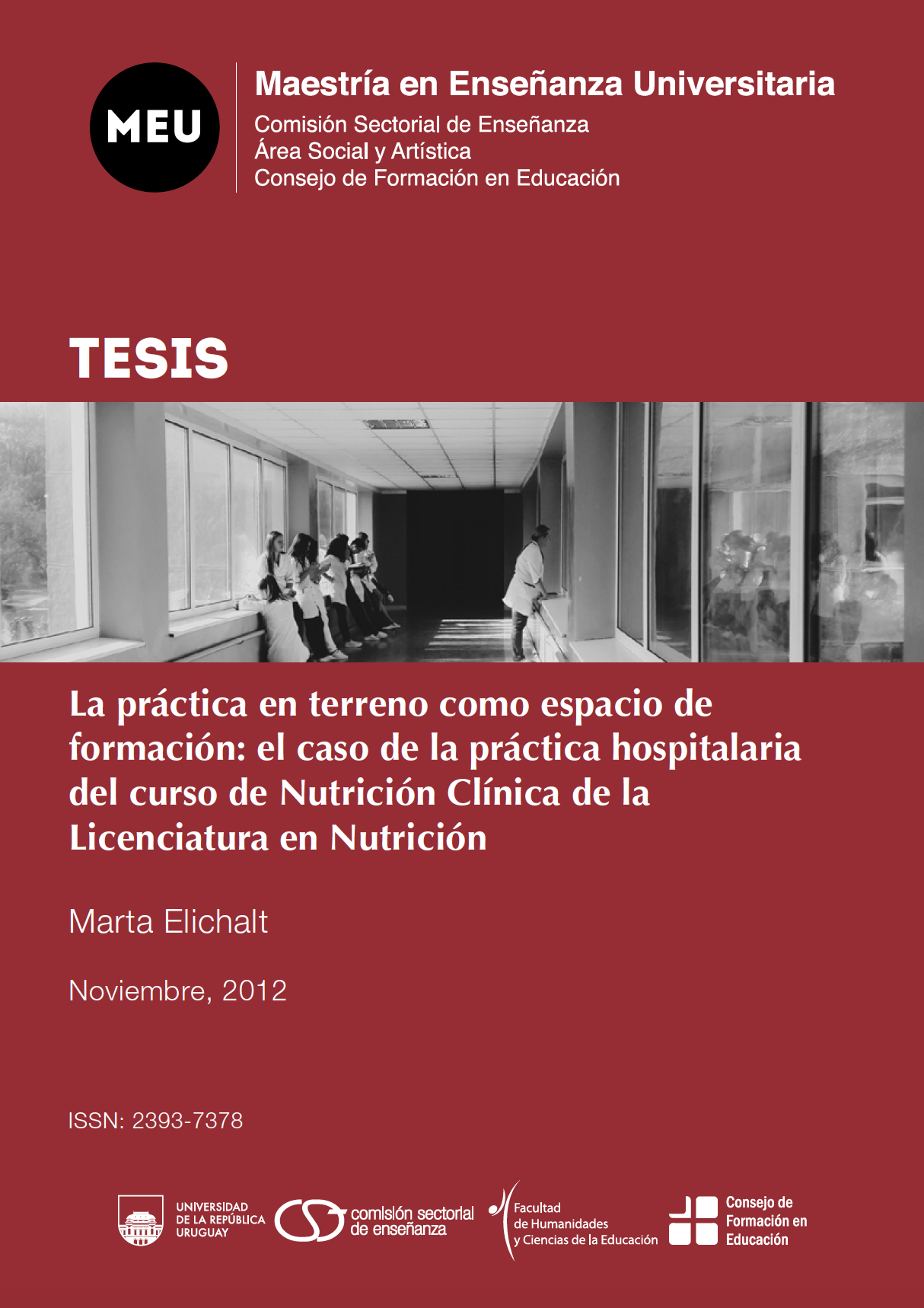Resumen
Esta investigación se ubica en el terreno de la didáctica universitaria y planteó como objetivo estudiar la adecuación entre la formación de las competencias requeridas por la disciplina nutrición clínica para la atención nutricional hospitalaria y la experiencia de formación en la práctica hospitalaria correspondiente al curso Nutrición Clínica de la Licenciatura en Nutrición de la Universidad de la República. En cuanto a la metodología, el estudio cuantitativo se basó en una encuesta realizada a todos los estudiantes del curso del año 2009. El análisis se centró fundamentalmente en la formación de competencias de dimensión técnica, humanística y procesal, el nivel de comprensión de los estudiantes de algunas actividades asignadas en la práctica, identificar estrategias metodológicas en el plan de trabajo propuesto al estudiante y determinar el conocimiento que tenía el estudiante de la atención nutricional hospitalaria. En el estudio cualitativo, a través de entrevistas se analizó la valoración estudiantil sobre la práctica como espacio de formación. Como resultado se destaca que la práctica fue real en la búsqueda inicial de información, pero no en la ejecución del tratamiento nutricional. Fue restringida la formación para la comunicación oral y escrita, el trabajo en equipo, la ejecución del tratamiento intrahospitalario y el monitoreo. La baja interacción de los estudiantes con la atención hospitalaria y los futuros colegas refleja debilidades de la práctica como enseñanza situada. Algunas actividades no fueron comprendidas totalmente por los estudiantes. Según estos la práctica les permitió ingresar a un mundo y rol inéditos, probarse, contextualizar el saber, comprender y formarse integralmente. Confrontaron lo que consideraban un modelo ideal de desempeño profesional con las experiencias de sus prácticas. Concuerdan en que primero deben conocer la teoría y luego realizar la práctica y evaluaron insuficiente la duración del curso y de la práctica. Advirtieron la ausencia de un docente que actuara como modelo para el desempeño y que los orientara técnica y afectivamente. La actitud para afrontar las dificultades los llevó a generar estrategias de aprendizaje autorregulado. Se concluye que la formación de competencias en la práctica no estuvo acorde a un nivel avanzado de la carrera. Se podría potencializar la enseñanza si se integraran la nutrición normal y clínica e incorporaran prácticas tempranas. El curso práctico requeriría recuperar conocimientos previos, potenciar el aprendizaje con un trabajo entre pares y aumentar la interacción con el contexto real. Los docentes deberían generar experiencias de andamiaje en terreno, a fin de facilitar el aprendizaje en las competencias requeridas.
Palabras claves
Formación de competencias, Nutrición clínica, Práctica hospitalaria
Abstract
This research, that can be placed in the field of University Didactics, aims to study the adequacy between the skills required for hospital nutrition care in the discipline of Clinical Nutrition and the hospital practice learning experience of the Clinical Nutrition course at the advanced level of the University of the Republic BS in Nutrition. With reference to methodology, the quantitative study was based on a survey posed to all course students in 2009. The analysis focused mainly on both the development of technical, humanistic and procedural skills and the understanding acquired by students through the performance of certain activities in practice. It also aimed at identifying methodological strategies in the work plan proposed to students and determining students’ knowledge of hospital nutritional care as well. In the qualitative study, students were interviewed in order to analyse their assessment of practice as a training opportunity. As a result, it could be determined that even though practice was real regarding the initial search for information, it was not in connection with the provision of nutritional treatment. Training in oral and written communication, team work, intrahospital treatment and monitoring were limited. Low interaction of students with hospital care and future colleagues reflects the weakness of practice understood as situated teaching. Certain activities were not quite understood. According to students, practice allowed them to enter a world and role unknown until then, test themselves, contextualize knowledge, understand, and receive comprehensive training. They confronted what they deemed as an ideal model for professional performance with the experience gained in practice. Students agreed that in the first place they should get to know the theory and then carry out the practice; they also found insufficient both the course duration and practice. They noticed the absence of a teacher that acted as a model of professional performance and who provided them with technical and emotional orientation. The attitude towards difficulties furthered the generation of self-regulated learning strategies. It is concluded that skill formation was not in line with an advanced educational level. Teaching should be leveraged by both integrating normal and clinical nutrition and incorporating early practice experiences. The practical course would require to recover previous knowledge, boost learning through peer-to-peer work, and increase interaction with real context. Teachers should generate underpinning experiences in the field in order to facilitate learning of required skills.
Keywords
Skill formation, Clinical Nutrition, Hospital practice
Director(es) de tesis
- Dr. Luis Carabajal
Tribunal
- Elisa Lucarelli
- Gabriel Kaplún
- Luis Carbajal
Fecha de Aprobación
05/11/2012
Dictamen
Aprobado con mención



